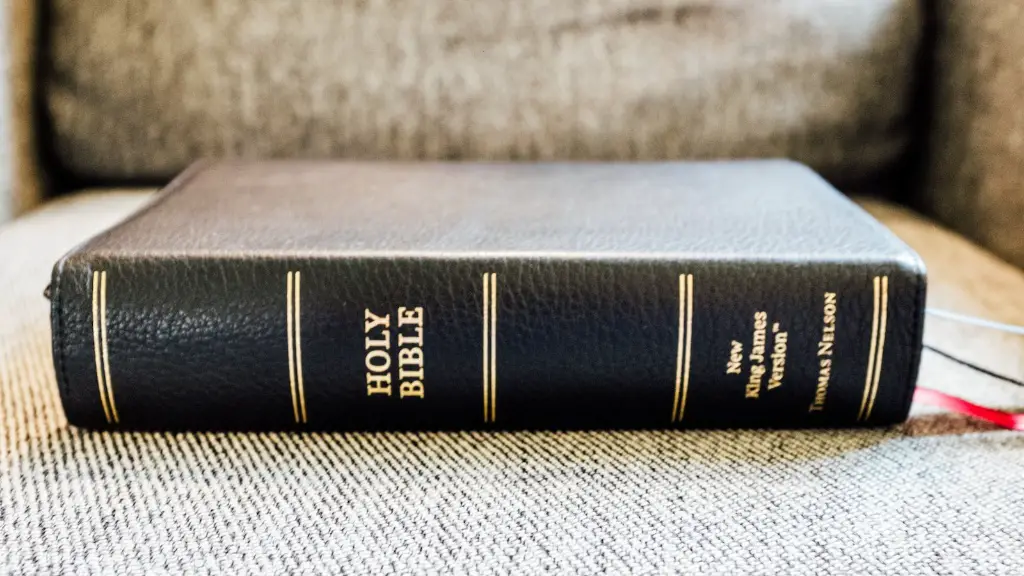Overview of Enoch
Enoch is a prominent figure in the Bible, mentioned again and again in the Old Testament. He is the seventh generation descendant of Adam, and is mentioned in Genesis 4:17–18, 5:21–24 and Hebrews 11:5. He is seen as the father of Metushelah, and the great grandfather of Noah. Enoch is described in different ways, as a ‘righteous man’, ‘a man devoted to God’, a prophet and as ‘walking with God.’
The book of Enoch, a non-canonical text, first appears in the early centuries BC. It includes Enoch’s teachings and is believed to have been written by a Hebrew scribe around the same time as when the Bible was written. It was read and quoted by some of the early Church Fathers and contains several references to Enoch and his life.
The book of Enoch is often seen as a Christian apocryphal text, but there is debate as to whether or not it contains an authentic record of what Enoch taught, or if it is a composite of different stories and beliefs. Some scholars have argued that the text may have been compiled by Hellenistic Jews who were living in Alexandria – a city in Egypt where much of the Jewish cultural and scholarship flourished.
Reasons of Enoch’s Omission
Enoch’s omission from the Bible remains one of the great mysteries of Scripture. It is difficult to trace the reasons for Enoch’s exclusion from the Bible, and there are several interpretations. One explanation is that Enoch was excluded from the Bible in order to make a clear distinction between God’s chosen people and others – since Enoch appears in several non-canonical works and in other cultures, his inclusion in the Bible may have caused confusion.
Another possible reason for Enoch’s omission from the Bible may be due to his reputation for esoteric knowledge. Enoch wrote a number of books that are not included in the Bible, and some of these were used in ancient mystery cults. His teachings may have been viewed as too unorthodox by Biblical authors, as they may have caused confusion or conflict with traditional religious beliefs.
Another explanation is that the book of Enoch was written after the Bible, and thus could not have been included in the Bible. This is further supported by the fact that 3 books of the Bible – Maccabees, Esther, and Judith – are not included in the Catholic or Protestant canon, but are part of the Apocrypha.
Enoch Outside of the Bible
Despite Enoch’s omission from the Bible, he has had a lasting impact on religious and cultural teachings. Enoch is mentioned more than once in the Quran, and is referred to as a prophet. He is also mentioned in a few Jewish texts such as the Talmud and the Book of Jubilees.
Enoch has been used as the basis for a number of occult and religious traditions, such as the Book of Enoch, the Third Book of Enoch, and Enochian Magic. He is also seen as a source of inspiration for the Rastafarian religion, which believes in faith healing and the power of African ancestry.
Enoch has been explored by authors in both fiction and non-fiction works. In the comic book series Spawn, Enoch is an immortal being who has been sent back to earth to take revenge on the world. In the novel Angel Time, by Anne Rice, Enoch is sent back to ancient Jerusalem, where he serves as a messiah-like figure.
Aftermath of Enoch’s Omission
Despite not being included in the Bible, Enoch has become an iconic and celebrated figure within religious and alternative circles. He is a source of comfort and inspiration for many, and a living reminder of the multifaceted nature of faith. Enoch’s story serves as a reminder that the Bible is more than just words on a page – it is an ever-evolving tapestry of faith, history, and culture.
Enoch is an undeniable part of the Bible story, and continues to be a source of fascination and debate. His absence from the Bible can be seen as an absence from history – one that has prompted people to ask questions and search for answers. Whether or not Enoch is in the Bible, his story continues to live on in the hearts, minds, and conversations of many.
Enoch in Christian Texts and Interpretations
Enoch’s absence from the Bible does not prevent his presence in Christian texts, though these references require interpretation. One of the most famous references to Enoch is in the New Testament Epistle of Jude, which cites a passage from 1 Enoch as prophetic. In Matthew 24:37-39, Jesus compares the days leading up to the great flood to the days before the coming of the Son of Man. This has been interpreted as a reference to Enoch and his prophecy of the flood.
Enoch is also referred to by early Church Fathers such as Justin Martyr, Irenaeus and Tertullian. In his Against Heresies, Irenaeus notes that “Enoch, the seventh from Adam, prophesied also concerning these men, saying…”. Similarly, Justin Martyr in Dialogue with Trypho goes as far as to liken Enoch to John the Baptist, as both were sent by God to tell people of the impending doom.
The mystique surrounding Enoch is further compounded by the Book of Enoch, which went on to become a cornerstone of some early Christian interpretations of Enoch’s life and ministry. The book provides an impressive glimpse into Enoch’s life and his mission of warning humanity of the coming judgement. It has also been seen as a source of comfort by some, as it provides a message of hope amidst the darkness.
How Enoch Influences Modern Thought
The presence of Enoch in modern thought is undeniable. His story has served as an inspiration to many, with some believing that Enoch’s spirit still resides among those devoted to God. The image of Enoch is often seen as a sign of redemption – an example of someone devoted to God, despite the fact that he is not in the Bible.
Enoch’s teachings continue to be explored by scholars, with some also believing that there is a connection between Enochian Magic and the Kabbalah. In recent years, new interpretations of Enoch have emerged, claiming that the omitted narrative directly changes the Christian point of view on salvation. Enoch is also often seen as a sign of the mysterious power of faith and belief.
Enoch’s influence continues to be felt in literature and cinema, with filmmakers often using him as a foil to traditional religious thinking. In 2014, director John Patrick Shanley used Enoch’s story as the basis for his film Doubt, which depicts a Catholic priest’s struggle with faith and doubt.
Conclusion
Enoch’s mysterious omission from the Bible continues to be a source of debate and speculation. While it is impossible to know the exact reason for his absence, his story has nonetheless been a source of fascination, comfort, and inspiration to many. Enoch’s teachings have had a lasting impact on both religious and non-religious individuals, and his presence in modern thought should serve as a reminder of the complexity and diversity of faith.




